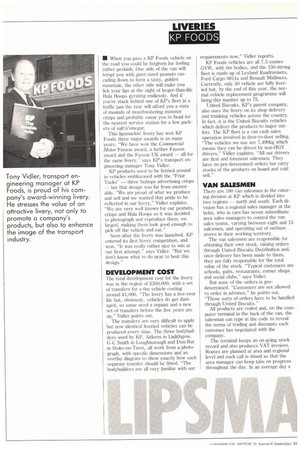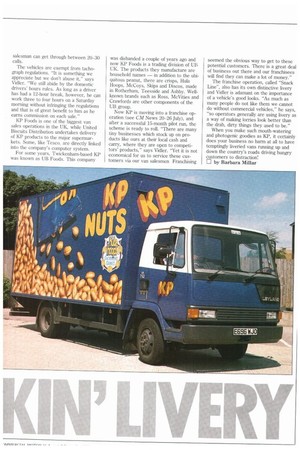LIVERIES KP FOODS
Page 44

Page 45

If you've noticed an error in this article please click here to report it so we can fix it.
• When you pass a KP Foods vehicle on the road you could be forgiven for feeling rather peckish. One side of the van will tempt you with giant-sized peanuts cascading down to form a tasty, golden mountain, the other side will make you lick your lips at the sight of larger-than-fife Hula Hoops gyrating endlessly. And if you're stuck behind one of KP's fleet in a traffic jam the rear will afford you a vista of mounds of mouthwatering monster crisps and probably cause you to head for the nearest service station for a few packets of salen'vinegar.
This lipsmackin' livery has won KP Foods three major awards in as many years. "We have won the Commercial Motor Fasson award, a further Fasson award and the Fasson UK award — all for the same livery," says KP's transport engineering manager Tony Vidler.
KP products used to be ferried around in vehicles emblazoned with the "Friar Tucks" — three bishops advertising crisps — but that design was far from memorable. "We are proud of what we produce and sell and we wanted that pride to be reflected in our livery," Vidler explains. "We are very well known for our peanuts, crisps and Hula Hoops so it was decided to photograph and reproduce them, enlarged, making them look good enough to pick off the vehicle and eat."
Soon after the livery was launched. KP entered its first livery competition, and won. "It was really rather nice to win at our first attempt," says Vidler. "But we don't know what to do next to beat this design."
DEVELOPMENT COST
The total development cost for the livery was in the region of 2350,000, with a set of transfers for a 6m vehicle costing around 21,000. "The livery has a five-year life but, obviously, vehicles do get damaged, so some need a repaint and a new set of transfers before the five years are up," Vidler points out.
The transfers are very difficult to apply but now identical liveried vehicles can be produced every time. The three bodybuilders used by KP, Aitkens in Linlithgow, G C Smith in Loughborough and Don-Bur in Stoke-on-Trent, all work from a photo • graph, with specific dimensions and an overlay diagram to show exactly how each separate transfer should be fitted. "The bodybuilders are all very familiar with our requirements now," Vidler reports.
KP Foods vehicles are all 7.5 tonnes GVW, with 6m bodies, and the 150-strong fleet is made up of Leyland Roadrunners, Ford Cargo 0811s and Renault Midliners. Currently, only 50 vehicle are fully liveried but, by the end of this year, the normal vehicle replacement programme will bring this number up to 75.
United Biscuits, KP's parent company, also uses the livery on its shop delivery and trunking vehicles across the country. In fact, it is the United Biscuits vehicles which deliver the products to major outlets. The KP fleet is a van cash sales operation involved in door-to-door selling. "The vehicles we use are 7,490kg which means they can be driven by non-HGV drivers," Vidler explains. "All our drivers are first and foremost salesmen. They have no pre-determined orders but carry stocks of the products on board and cold sell."
VAN SALESMEN
There are 180 van salesmen in the catering division at KP which is divided into two regions — north and south. Each division has a regional sales manager at the helm, who in turn has seven subordinate area sales managers to control the van sales teams, varying between eight and 15 salesmen, and operating out of outbase stores in their working territory.
The van salesmen are responsible for obtaining their own stock, raising orders through United Biscuits Distribution and, once delivery has been made to them, they are fully responsible for the total value of the stock. "Typical customers are schools, pubs, restaurants, corner shops and social clubs," says Vidler.
But none of the orders is predetermined. "Customers are not allowed to order in advance," he points out. "Those sorts of orders have to be handled through United Biscuits."
All products are coded and, on the computer terminal in the back of the van, the salesman can type in the code to reveal the terms of trading and discounts each customer has negotiated with the company.
The terminal keeps an on-going stock record and also produces VAT invoices. Routes are planned at area and regional level and each call is timed so that the area manager can keep tabs on progress throughout the day. In an average day a salesman can get through between 20-30 calls.
The vehicles are exempt from tachograph regulations. "It is something we appreciate but we don't abuse it," says Vidler. "We still abide by the domestic drivers' hours rules. As long as a driver has had a 12-hour break, however, he can work three to four hours on a Saturday morning without infringing the regulations and that is of great benefit to him as he earns commission on each sale."
KP Foods is one of the biggest van sales operations in the UK, while United Biscuits Distribution undertakes delivery of KP products to the major supermarkets. Some, like Tescor are directly linked into the company's computer system.
For some years, Twickenham-based KP was known as UB Foods. This company was disbanded a couple of years ago and now KP Foods is a trading division of UB UK. The products they manufacture are household names — in addition to the ubiquitous peanut, there are crisps, Hula Hoops, McCoys, Skips and Discos, made in Rotherham, Teesside and Ashby. Wellknown brands such as Ross, McVities and Crawfords are other components of the UB group.
Now KP is moving into a franchise operation (see CM News 20-26 July), and after a successful 15-month pilot run, the scheme is ready to roll. "There are many tiny businesses which stock up on products like ours at their local cash and carry, where they are open to competitors' products," says Vidler. "Yet it is not economical for us to service these customers via our van salesmen Franchising
seemed the obvious way to get to these potential customers. There is a great deal of business out there and our franchisees will find they can make a lot of money."
The franchise operation, called "Snack Line", also has its own distinctive livery and Vidler is adamant on the importance of a vehicle's good looks. "As much as many people do not like them we cannot do without commercial vehicles," he says, "so operators generally are using livery as a way of making lorries look better than the drab, dirty things they used to be."
When you make such mouth-watering and photogenic goodies as KP, it certainly does your business no harm at all to have temptingly liveried vans running up and down the country's roads driving hungry customers to distraction!
by Barbara Millar
































































































































